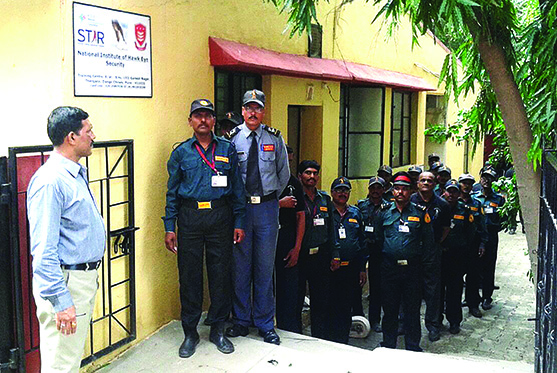Private security agencies and their personnel are becoming all-pervasive. Their deployment has seen a significant rise in recent times, enhancing safety and security at private enterprises and public places.
Private security personnel, however, continue to be poorly trained when compared to Law Enforcement agencies. Maj Gen Das looks at the training imperitives for these personnel.
In the current environment, Private Security Agencies should augment the Police force in almost all security-related policing activities. Industries, PSUs, and government organisations have adopted hiring private security to meet their specific requirements. This proves to be cost-effective and simultaneously empowers the youth. In fact, many state governments have eliminated the recruitment of the “Group D” cadre by encouraging the outsourcing of this cadre through the Services industry for manpower and Private Security Agencies for Man Guarding.
A close look reveals the comprehensive canvas of requirements for government agencies, Industries, including heavy industries, Hospitality, Healthcare, Education, Logistics, and others. The volume is large, and the qualitative requirements of each type of industry or Government office will differ for every kind of job in terms of manpower. Similarly, for security-related tasks in various sectors, additional skills will be required beyond the basics specific to that industry.
Therefore, a comprehensive modular training schedule is necessary for such a workforce to achieve standardisation. This will integrate skills in guarding and simultaneously train individuals in the soft skills required for dealing with citizens in various types of locations, where they are to be deployed. This aspect remains a significant challenge in the Private Security Industry in India.
Private Security agencies are governed by the PSAR Act, 2005, and the PSAR Act Model Rules of 2020, issued by the Government of India. The act provides guidelines for states to follow. In continuation, states have their own PSAR acts or Guidelines to be complied with for the issuance of licenses. One of the primary criteria is imparting training to the employee, as outlined in Section 9 of the PSAR Act of 2005, as amended from time to time. The State Governments issue the elaborated training standards needed for their respective states. This is to be adhered to when deploying Personnel for Security tasks by private security companies operating in their respective states.
Thus, it is the duty of private security companies to provide a trained workforce or train them at the respective location where the workforce is deployed. The conditions and specific requirements of the particular industry vary. After basic training, specialisation in that industry is definitely a necessity.
The training must be conducted with deliberate planning, taking into account the duration, syllabus, and appropriate infrastructure for physical training, as well as billeting facilities. This should cover the basic training. Capsules for the requirements of various industries must be planned with suitable instructors. A point to note is on during the basic and specialised training the candidates must be made aware of the functioning of the private security management system, the customer’s responsibility/requirements and the functioning of the Police, so that they are conversant of the fundamental legal aspects Practical training of incident report filing and response to any emergency must be included in the basic training. It is pertinent to note that the Guards on the ground are the “First Responders” to any untoward incident.
Fundamentally, the following subjects are relevant in the Private Security industry as of now:
- Physical Fitness: Fresh Inductees have to achieve a desired physical standard, and this has to be worked out in consultation with the Police Recruiting authorities and the Medical fraternity. This depends upon the physical parameters and the climatic conditions. State governments should establish a committee to outline the physical fitness standards for their employees. During the first seven days of shaping physical fitness, the inductees will concurrently be trained to instil a sense of good discipline by going through the “Drill Parade” as done in all uniformed services.
- Principles of Guarding: The Safety and security of the assets are Priorities of the customer. Controlling access to the assigned assets or real estate tasked for guarding.
- The Traffic and crowd control within and in the immediate proximity of the asset.
- Assistance by the Security can be provided in-housekeeping, including loss prevention.
- Personal Development.
- Personal Leadership as a Security Man.
- Guard’s personal presentation, which is turn out and demeanour.
- Individual trainee’s Personal hygiene
- Explain the importance of proper behaviour towards customers and visitors.
- Teach about the importance of physical fitness through yoga or exercises.
- Soft Skills
- Improve verbal and written communication skills.
- Customer interaction with politeness but firm, where needed.
- Understanding of Gender sensitisation/inclusion
- Be an ambassador of the organisation that he belongs to.
- Response
- Guards must have a quick response to emergencies when they occur.
- Communication/ contact with Police/Fire Brigade.
- First Aid and Ambulance support.
- Have proficiency in Digital Skills to pass the information quickly.
- Responsibility and preparation as the first responder in any situation that warrants intervention, within the confines of the law.
Following the completion of the above-mentioned training, a brief three- to seven-day training capsule may be conducted at the deployment site. This will be necessary for orienting security personnel to the type of industry they are being assigned to carry out their duties. Such specialised capsules are recommended as refresher training on a bi-monthly basis. This is in addition to the weekly training provided to the guards. Therefore, the first three months are crucial. In case of reliefs, they must go through the same module after joining the site as a reliever. On the logistics side, the lodging and boarding facility has to be catered for. All of these will also require regular maintenance.
Next in line is the infrastructure requirement. The basic infrastructure is required to have a ground for outdoor physical training and classrooms for indoor training, including classes on digital support systems. To provide an ideal training establishment, such infrastructure must be well-staffed with qualified personnel who will contribute to the development of good Guards for employment.
Now, with all these issues related to real estate and infrastructure, the financial dimension must be considered. To meet the finances, some of the suggestions are:
- Either such institutes are given some subsidy by the government, like government-funded private colleges, as part of the Skill Development scheme.
- Corporate houses take on the project as part of their CSIR contribution.
- A soft loan will be provided for setting up such schools.
- Reduce the need for logistics by admitting local aspirants.
Then come the candidates and the fees, accompanied by assurances of employment. Individual candidates are required to pay for admission and training/logistics. The representatives of the local government should fix the amount. This is to ensure that aspirants are not subjected to higher fees. It is mandatory that, before admission to such schools, a medical test as per the state’s PSAR Act is conducted. This is to prevent any future complications related to health and insurance.
Maintaining the desired standards and regularly updating them in accordance with contemporary requirements is the next step. To verify the standards, an independent committee at the state level should be set up. Each zone of the state must be represented, and the state’s Home Department must issue a guideline or checklist. This document must be specific with a limited tolerance variation to mitigate minor quantification standards differentials, or have three grades: Satisfactory/Good/Excellent.
The aspect of on-the-job training should be part of the curriculum. This pertains to the ongoing training of deployed personnel and those who have not yet completed their full training program, which requires a specific number of hours. The syllabi must be tailored for both categories: those who are refresher students and those who are pending completion of the program. Again, for the same reason, an audit of the quality of training imparted must be conducted by an independent agency.
This approach will provide a progressive method of training that encompasses basic modules followed by specialised capsules. Here, the advantage is that candidates can enhance their qualifications according to their chosen field of expertise. Subsequently, “Add On” training on digital applications can be given to empower the guards in carrying out their tasks more efficiently. Similarly, for the gunmen, a detailed seven-day capsule will be necessary for them to understand and comprehend the rules, regulations, and acts related to the subject. Additionally, the integration of technology and safety drills in cash logistics or personal security can be taught as a regular update at the site as well.
To quote Business Line (The Hindu) dated 03 February 2025, some of the data showing the potential of this Industry is
- As of January 2025, there are 26,229 private security agencies in India.
- Approximately 7-10 million personnel join the Industry each year, and around 20 per cent are trained by organised PSAR-compliant training institutes.
- The expected growth of this industry is 35 per cent or more by 2026.
Considering future expansion in security related to technology, it is prudent that we adopt modular training methods. Simultaneously, conduct On-the-Job Training to upgrade the skills of personnel deployed in security-related tasks regularly. This will go a long way in providing a high-quality workforce to meet clients’ requirements. With this, the clients’ satisfaction level will improve. Furthermore, such training should also be conducted for supervisory and junior-level managerial staff. The contents and training methods should align with those of the Guards. As such, we, as a nation, have a rapidly growing economy. To achieve global recognition as a reputable security service provider, such investments will go a long way in enhancing our image and, at the same time, provide employment opportunities in urban, semi-urban, and rural sectors.
Notes: References are:-
- PSAR Act 2005 issued by the Government of India, Sections 9(2), 10(d) and 11.
- PSA Model Rules 2020 issued by MHA, Government of India, Sections 4(3) and 8.








